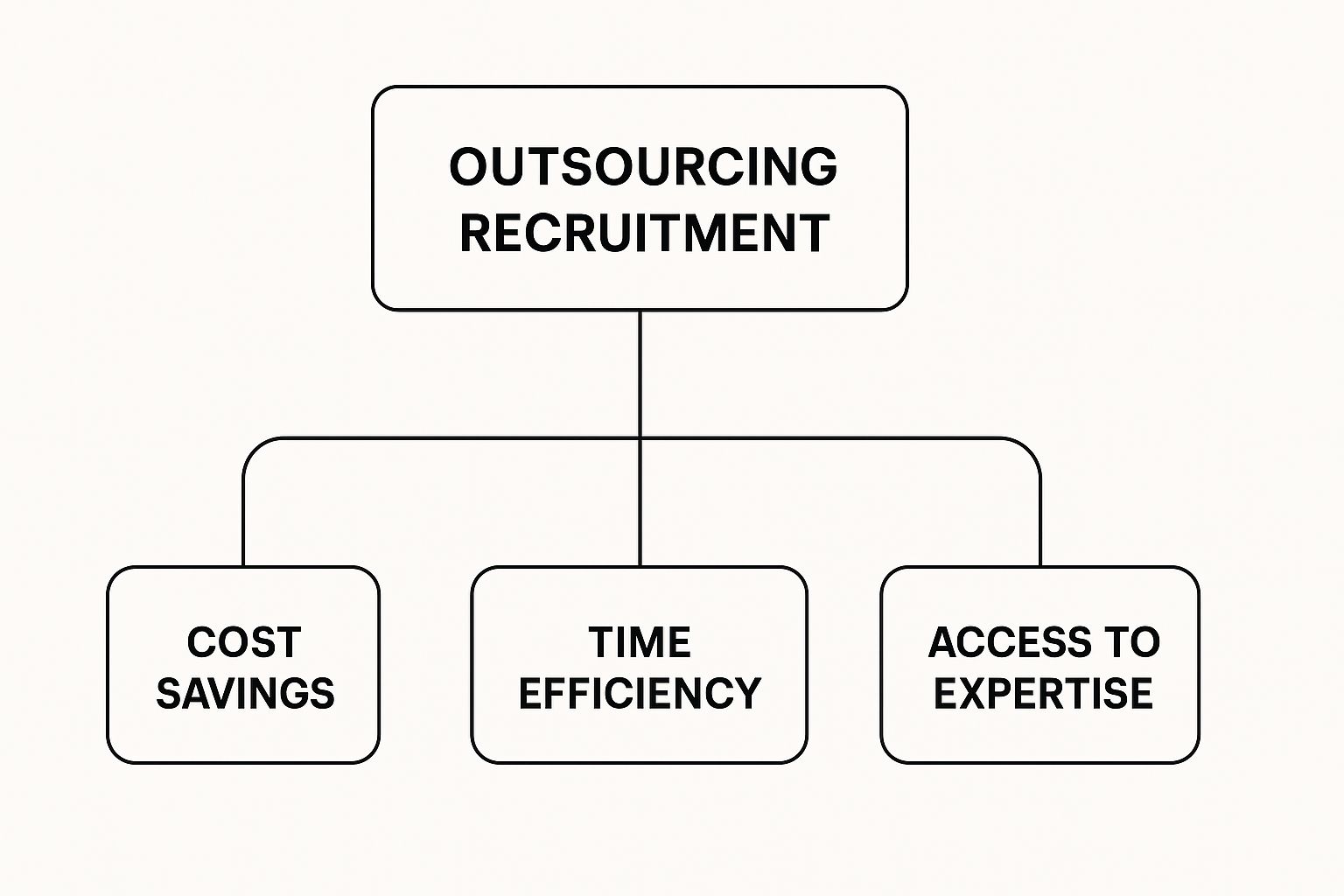So, what exactly is outsourcing recruitment? At its core, it's a strategic move where you bring in an external company to handle some, or even all, of your hiring process. This isn't just about handing off a job posting; it's about forming a genuine partnership to find the right people for your team, from sourcing and screening all the way to making the final offer.

Unpacking Recruitment Process Outsourcing
Think of it this way: instead of trying to be a master of all trades—juggling plumbers, electricians, and carpenters to build a house—you hire a general contractor. You bring in an expert who knows the ins and outs, manages the entire project, and ensures everything is built to your exact specifications.
This is precisely what a Recruitment Process Outsourcing (RPO) provider does for your hiring. They become an extension of your own company, not just some third-party service. They dive deep into your company culture, understand your long-term goals, and represent your brand to find candidates who will truly thrive and stick around.
This deep integration is what sets RPO apart from a typical staffing agency, which often focuses on quickly filling a single, sometimes temporary, role.
A Strategic Response to a Tough Market
Let's face it, finding great talent is harder than ever. With a staggering 74% of employers saying they struggle to find skilled professionals, the old ways of hiring just don't cut it anymore. This is why the global outsourcing market, valued at $302.62 billion in 2024, is expected to jump to over $525.23 billion by 2030.
RPO is a massive part of that growth. Companies are realizing it's not just a way to save a few bucks; it’s a powerful strategy for getting ahead.
The core idea of RPO is to transfer ownership of the recruitment process to a dedicated expert. This allows your internal team to focus on core business functions while the RPO partner builds a pipeline of top-tier talent.
This partnership gives you the flexibility and access to vast talent networks that most companies simply can't build on their own. For a more detailed breakdown, this guide on Recruitment Process Outsourcing explained is a great resource. It's all about creating a sustainable talent engine that can scale right alongside your business.
In-House vs Outsourced Recruitment At a Glance
To make the distinction clearer, let’s quickly compare managing recruitment internally versus bringing in an RPO partner.
| Aspect | In-House Recruitment | Outsourcing Recruitment (RPO) |
|---|---|---|
| Control | Full, direct control over the entire process. | Shared control; strategic direction is set internally. |
| Cost Structure | Fixed costs (salaries, benefits, overhead). | Flexible, often based on hiring volume or a fixed fee. |
| Expertise | Limited to the internal team's knowledge. | Access to specialized recruiters and industry experts. |
| Technology | Requires investment in and management of HR tech. | Leverages the provider's advanced tools and platforms. |
| Scalability | Difficult to scale up or down quickly. | Highly scalable to meet fluctuating hiring demands. |
| Focus | HR team juggles recruitment with other duties. | Dedicated focus solely on talent acquisition. |
Ultimately, the choice depends on your company's specific needs, but this table highlights the fundamental differences in approach and resources.
Finding Your Fit with Different Outsourcing Models
Recruitment Process Outsourcing (RPO) isn't a one-size-fits-all solution. Far from it. The best partnerships are flexible, shaping themselves around a company's specific needs, size, and long-term goals. It's a bit like choosing a vehicle: you wouldn't take a cargo ship to get across town, and you certainly wouldn't try to cross an ocean on a bicycle.
In the same way, how you work with an outsourcing partner depends entirely on what you're trying to accomplish. There are a few distinct models out there, each built for different business scenarios. This ensures you only pay for what you truly need and get the exact support required to build your team right. Getting a handle on these options is the first, most important step.
This image really highlights the core reasons companies turn to recruitment outsourcing.

As you can see, it’s about much more than just saving a few dollars. The real value comes from a mix of speed, efficiency, and tapping into specialized expertise you might not have in-house.
Full-Cycle RPO: The All-Inclusive Partnership
Think of Full-Cycle RPO as the most comprehensive option on the menu. Also known as end-to-end RPO, this is where the provider takes over your entire recruitment function. They handle everything from crafting compelling job descriptions and sourcing top talent to screening candidates, scheduling interviews, and even managing offers and onboarding. It's like having a world-class talent acquisition department plugged directly into your company.
This model is a game-changer for:
- Companies in rapid-growth mode that need to scale their teams quickly without the headache of building a recruitment function from the ground up.
- Businesses that don't have a dedicated HR or recruiting team and need a complete, ready-to-go solution.
- Organizations expanding into new regions where they need instant access to local hiring knowledge and networks.
Project-Based RPO: For Specific Missions
Sometimes you don't need a standing army; you just need a special forces team for a defined mission. That’s the thinking behind Project-Based RPO. This model is perfectly designed for tackling a specific, time-sensitive hiring challenge.
For example, imagine a tech company getting ready to launch a new flagship product. They suddenly need to hire 20 software engineers and 5 product managers, all within the next three months. A project-based RPO partner can swoop in, run the entire hiring campaign, and then step away once the mission is accomplished.
It's also a fantastic fit for staffing up a new office, filling all the roles for a major new contract, or quickly building out an entirely new department from scratch. You get laser-focused expertise without the long-term overhead.
On-Demand Recruitment: Flexible, Expert Support
Finally, we have On-Demand Recruitment, which offers the most flexibility of all. With this model, you get access to a professional recruiter on an as-needed basis, almost like having a consultant on retainer. You might bring them in for a few hours a week to clear a backlog or to focus on a single, notoriously hard-to-fill position.
This approach is perfect for companies that already have a good internal team but occasionally hit a wall. Maybe they have a sudden spike in hiring needs or are struggling to find someone for a highly specialized role. It’s a smart, cost-effective way to inject senior-level recruiting power exactly when and where you need it most.
The Real-World Benefits of Outsourcing Your Hiring
Let's move past the theory. When you actually decide to outsource your hiring process, you unlock tangible, strategic advantages that can genuinely reshape your entire organization. The benefits go far beyond just filling open roles; they help you build a more agile, efficient, and competitive business from the ground up.

One of the first places you'll see a difference is your bottom line. An RPO partnership completely changes how you account for recruitment costs. Instead of a fixed overhead—think salaries, benefits, and software licenses for an in-house team—it becomes a flexible, variable expense. This means you’re not paying for recruitment capacity you aren't using during slower periods, which cuts down on waste significantly.
Expand Your Reach and Improve Hire Quality
A top-tier RPO provider does more than just post job ads; they are active talent hunters. They bring extensive networks, sophisticated sourcing tools, and deep industry knowledge to the table—an arsenal that most companies simply can't afford to build internally.
This immediately gives you access to a much wider and more diverse pool of candidates. This includes the elusive passive talent, those top performers who aren't even looking for a new job but are open to the right opportunity.
When you cast a wider net, the quality of your hires naturally improves. You're no longer stuck choosing the best available local candidate; you're selecting from the best talent in the market, full stop. This specialized focus is especially vital in competitive fields. For a closer look at how this works in a niche sector, you can explore the top benefits of hiring a Web3 recruiting agency.
Achieve True Scalability and a Technological Edge
Business needs are never static. A sudden growth spurt, a new product launch, or expansion into a new market can create an urgent need to hire, and fast. An RPO partner lets you scale your recruitment muscle up or down almost instantly, without the painful process of hiring or laying off your internal recruiters.
This kind of agility is a massive competitive advantage. What's more, outsourcing gives you immediate access to the provider’s entire technology stack.
RPO has evolved from a simple cost-cutting tactic into a strategic function for accessing specialized hiring expertise. This shift helps companies achieve an average return on investment (ROI) of 191%, driven by both cost efficiencies and superior hiring outcomes. A striking 87% of HR leaders now plan to integrate AI into their workflows through outsourced partners to streamline screening and communication. You can discover more insights about these HR outsourcing statistics on insigniaresource.com.
This means you get all the benefits of best-in-class applicant tracking systems (ATS), AI-powered sourcing tools, and data analytics without the hefty upfront investment. Just like with other operational functions, optimizing your recruitment pipeline is a key part of driving wider business efficiency. To learn more, check out our guide on how to get started with business process automation. This strategic partnership also helps ensure you stay compliant with ever-changing employment laws, which significantly reduces your legal risk.
Why Companies Decide to Outsource Recruiting Now
The decision to bring in an outside recruiting partner rarely happens on a whim. It's usually born out of necessity—a direct response to very real, very specific hiring headaches that the internal team just can’t solve on its own. Let's be honest, the modern talent market is a battlefield, and the old hiring playbook often isn't enough to win.
Today's companies are getting squeezed from multiple angles. They're trying to scale their teams at breakneck speed to keep up with growth, but finding people with specialized skills—think software engineers or data scientists—has turned into a massive bottleneck. This isn't just about hiring faster; it's about finding the right people who can give you a genuine competitive advantage.
Shifting from Cost-Cutting to Talent-Winning
It wasn't that long ago that outsourcing was all about one thing: saving money. But that's changed. The conversation has moved from a purely financial calculation to a strategic one focused on landing top-tier talent. It's now a proactive play to tap into expertise, technology, and candidate networks that would otherwise be out of reach.
Just think about the complexities of managing a global, remote workforce or trying to expand into new markets. These challenges add layers of difficulty that most in-house HR teams simply aren't built for. A good external partner already has the processes and global reach in place, turning what was a major hurdle into a new opportunity.
A recent analysis captures this shift perfectly. While 70% of businesses pointed to cost savings as their main reason for outsourcing in 2024, that number fell to just 34% by 2025. What took its place? Access to better talent, which 42% now see as the top priority. This data signals a major strategic pivot. You can explore more of these outsourcing trends and statistics on virtuallatinos.com.
What this really tells us is that companies are no longer just looking for a cheaper way to hire. They're looking for a genuine ally who can consistently find and deliver high-quality people.
The Most Common Triggers for Outsourcing
So, what are the classic warning signs that it’s time to call in a recruitment partner? The triggers are usually pretty clear once you know what to look for.
- Intense Competition for Skills: Every time you post a key role, you find yourself in a bidding war with competitors.
- Need for Rapid Growth: A startup just landed a huge funding round and now needs to double its team in six months. Sound familiar?
- Overburdened Internal Team: Your HR department is completely underwater, and the quality of your hiring process is starting to suffer because of it.
- Global or Remote Expansion: You need to hire people in new countries or manage a distributed team without running into compliance issues.
If any of these pain points hit close to home, it’s a pretty strong signal that your company is dealing with the exact challenges an RPO partnership is designed to fix.
How to Choose the Right Outsourcing Partner
Picking a recruitment partner is one of the most important decisions you'll make for your business. This isn't just about hiring a vendor; you're entrusting another company to represent your brand to the world of talent. The right partner acts as a true extension of your team, but the wrong one can do real damage to your reputation and bring your growth to a screeching halt.

It's tempting to just compare prices, but you have to go deeper. You’re looking for a provider that genuinely gets your company’s mission, culture, and the specific demands of your industry. A great partnership is built on this shared understanding and a proven ability to deliver.
Evaluate Their Industry Expertise
Does the potential partner actually know your world? A firm that recruits for tech startups has a completely different network and mindset than one that specializes in placing nurses in hospitals. You have to ask them to get specific about their experience.
A partner with relevant industry chops will already understand your unique challenges. They can "talk the talk" with candidates and likely have a ready-made network of qualified people. This kind of specialized knowledge is a shortcut to a faster hiring process and a higher caliber of talent.
Assess Their Sourcing Methods and Technology
So, how do they actually find people? A modern recruitment partner should be using a whole lot more than just a LinkedIn job post. Ask them about their sourcing technology, their access to databases of passive candidates (people not actively looking), and how they use data to make their searches smarter.
A partner’s tech stack tells you a lot about their efficiency. Look for providers who use sophisticated applicant tracking systems (ATS), AI-powered screening tools, and strong analytics platforms. This technological advantage is a huge part of what you’re paying for.
Understanding their process gives you the confidence that they are actively hunting for top talent, not just passively waiting for résumés to show up in an inbox.
Verify Their Track Record and Cultural Fit
Finally, you need proof they can do the job and a sense that they'll fit in with your company culture. Any reputable provider will be happy to share case studies and let you talk to their current clients. Speaking directly with their other customers gives you an unfiltered look at their communication style, how reliable they are, and whether they deliver on their promises.
Cultural fit is just as critical. Remember, this team will be the very first impression many candidates have of your company.
- Brand Representation: Do they truly understand and reflect your company's mission and values?
- Communication Style: Does their approach to communication feel compatible with yours?
- Candidate Experience: How will they make sure every single applicant, successful or not, has a positive interaction with your brand?
Finding a partner with deep expertise in a niche field can be a game-changer. For example, if you're trying to find one of the top companies in India offering staffing for Automated Speech Recognition (ASR) services, you need a specialized provider with proven results in that exact area. Make sure they can be a true ambassador for your organization.
Common Myths About Recruitment Outsourcing
https://www.youtube.com/embed/3__AL-uHqFI
When people first start looking into outsourcing their recruitment, they usually run into the same few myths. These persistent worries can easily stop a fantastic partnership in its tracks, leaving businesses stuck with hiring methods that just aren't working. It's time to set the record straight and debunk the biggest misconceptions out there.
The number one fear? Losing control. Business leaders get anxious, thinking an outside partner won't care about quality and will just throw candidates at them to hit a number. The reality of a modern recruitment partnership is built on complete transparency and collaboration.
You’re still in the driver’s seat. You set the strategy, you define what makes a great candidate, and you always have the final word on who gets hired. Think of your RPO partner as a specialized operational team that executes your vision with expert tools and knowledge, keeping you updated with constant reporting and analytics. It’s not about giving up control; it’s about gaining a powerful new capability.
Myth 1: Outsiders Can't Understand Our Culture
Another big worry is that an external team could never really get the unique vibe and unwritten rules of your company culture. It’s a fair question—how can someone who isn’t in your office day-to-day find people who will genuinely thrive?
Any RPO provider worth their salt kicks off a partnership with a deep dive into your company. They essentially become students of your brand, learning everything from your mission and values to the feel of your workplace. Their entire job is to act as a true ambassador for you. After all, their success hinges on finding candidates who have the right skills and fit your culture, ensuring they stick around for the long haul.
A great RPO partner's goal isn't to be an "outsider." It's to become such a seamless extension of your team that the lines begin to blur. They embed themselves in your brand to make sure every candidate interaction feels authentically you.
This alignment isn’t a one-and-done deal. It’s maintained through a constant feedback loop and a serious commitment to data-driven decision making that sharpens their search over time. By looking at performance data and the success of new hires, their understanding of your culture only gets better.
Myth 2: It's Only a Solution for Huge Corporations
Finally, there’s this stubborn idea that outsourcing recruitment is only for massive corporations hiring thousands of people. That simply isn't the case anymore.
The truth is, recruitment outsourcing is incredibly flexible. Models like project-based and on-demand RPO were created specifically with small and mid-sized businesses in mind. These solutions give you access to world-class recruiting expertise without the hefty price tag of an in-house team, making it a smart, scalable strategy for companies of all sizes.
Frequently Asked Questions About Outsourcing Recruitment
Even after getting a handle on the different models and benefits, you'll probably still have some practical questions. Bringing in an outside recruitment partner is a big move, so let's tackle the most common concerns to help you get a clearer picture.
What’s the Real Cost of Outsourcing Recruitment?
There’s no single price tag, because the cost really depends on how you decide to work with a provider. Think of it like a mobile phone plan—you pick the one that fits your usage.
- Management Fee: This is a predictable, fixed monthly fee. It covers the provider's team and their work, making it a great option if you have consistent, ongoing hiring needs. Budgeting is a breeze with this model.
- Pay-for-Performance: Just like it sounds, you only pay when you successfully hire someone. The cost per hire might be a bit higher here because the provider is taking on all the risk, but it directly ties your spending to results.
- Blended or Hybrid Model: This is the best of both worlds. You'll have a smaller monthly management fee for stability, plus a success fee for each placement. It creates a nice balance where both you and the provider have skin in the game.
Ultimately, your final cost will come down to how many people you need to hire, how complex the roles are, and the specific terms you agree on.
The smartest way to approach this is to match the pricing model to your company's hiring rhythm. If you hire in waves, a pay-for-performance model makes a lot of sense. But if you’re always looking for new talent, a fixed management fee often provides better value.
How Long Does It Take to Get Started?
Getting a new recruitment partnership up and running usually takes between two and six weeks.
The timeline really hinges on how deep the partnership goes. A full-cycle RPO, where the provider handles everything from start to finish, naturally takes more setup time than a simple, one-off project.
This initial period is all about the groundwork. Your provider will dig deep to understand your company culture, agree on performance metrics (KPIs), connect their tech with yours, and figure out the best way to communicate. A solid setup is non-negotiable—it’s what allows your partner to act as a genuine extension of your brand right from the get-go.
Will We Lose Control Over Who Gets Hired?
Absolutely not. This is probably the biggest myth out there, but a good partnership is built on collaboration, not a takeover. You always have the final say on every single hire.
Your recruitment partner runs the process—they do the heavy lifting of sourcing, screening, and lining up qualified candidates. But your team still holds the most important cards: conducting the final interviews and making the ultimate decision. You define what a great hire looks like, and the provider executes that strategy, bringing you a handpicked shortlist of the best people for you to choose from.
Ready to unlock a more efficient and strategic way to build your team? At Zilo AI, we provide expert manpower solutions tailored to your unique business needs. Whether you're scaling a tech team or need specialized data professionals, we act as your dedicated partner to find the talent that will drive your growth. Discover how our recruitment services can give you a competitive edge.

